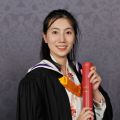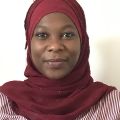Hear from our students
What is it like to undertake a DPhil at the Department of Paediatrics? We asked some of the students here to share their interests, their projects and why they picked this department at the University of Oxford, over all others.
|
Nationality: British Background: Previously Chemistry, now an Infectious Diseases medical doctor Research group: Oxford Vaccine Group After school, I took a year out and then completed a degree and masters in Natural Sciences, specialising in Chemistry. After another year out, I changed direction and studied graduate medicine. I am now an infectious diseases doctor. DPhil project: My DPhil project focuses on COVID vaccines – heterologous primary course vaccination and the effect of interval. I am also investigating mucosal immune responses to vaccination and infection. Why did you choose to join the Department of Paediatrics? I chose to join the Department of Paediatrics because of the closely allied work in the Oxford Vaccine Group to my clinical infection work. There are plenty of opportunities to take advantage of, with enough time management, The department has financial support available and has also been a supportive environment for me as we had two children over the course of my DPhil. |
|
Nationality: Chinese Background: Mathematics Research group: Paediatric Neuroimaging Group I graduated with a 4-year undergraduate master's degree in Mathematics from Imperial College London, during which I completed my master’s research project in modelling scRNA-sequencing velocity data. My research interests lie in the clinical application of mathematical models and machine learning methods. DPhil project: My DPhil project focuses on apnoea in premature infants. I aim to better understand the impact of apnoea and to investigate whether we can predict when apnoeas can occur so that their negative effects can be avoided. I also aim to predict the personalised caffeine dose requirements for individual infants. Why did you choose to join the Department of Paediatrics? I chose to join the Department of Paediatrics because it offers a fantastic cross-disciplinary research environment. The mix of doctors, nurses, engineers, and mathematicians within the research teams allows me to apply my mathematical background to clinical research. In addition, the Department provides considerable support to students both academically and financially. |
|
Nationality: Nigerian Background: Medicine Research group: Paediatric Neuroimaging Group I studied Medicine at Igbinedion University, Nigeria and have an MSc in Tropical Paediatrics from the University of Liverpool. I qualified as a Consultant Paediatrician in 2020, receiving the Fellow of West African College of Physicians (FWACP, Paediatrics) certification. From April 2021 to August 2023, I worked as a Consultant Paediatrician and clinical lecturer at Afe Babalola University and its Multi-System Hospital in Ado-Ekiti, Nigeria. DPhil project: My research focuses on identifying clinical biomarkers for individualized care in the administration of caffeine in the management of apnoea of prematurity, with the aim of optimizing drug dosing and minimizing side effects. Why did you choose to join the Department of Paediatrics? I chose to join the Department of Paediatrics because of its reputation for research excellence and dedication to advancing high-quality research. In addition, the Department’s commitment to providing substantial support for DPhil studies greatly influenced my decision, and I am grateful for the opportunity. |
|
Nationality: British Background: Engineering Research group: Paediatric Neuroimaging Group I studied biomedical engineering at the University of Sheffield, and clinical science at King’s College London. Before my DPhil, I worked for the UK’s National Health Service as a clinical scientist. In this job I saw patients with neurological disorders and analysed movement analysis data, to guide their treatment. DPhil project: Neuroimaging can identify pain in newborn babies, and my DPhil develops methods for doing that better, more reliably, and more reproducibly. What attracted you to your DPhil? The chance to do translational research that could directly impact people’s lives by mixing the clinical and the physical sciences. The mix of backgrounds in the research group and in the wider department is fantastic – from medicine to mathematics and from neuroscience to neural networks, you can always find someone who knows about any given topic. |
|
Nationality: Nigerian Background: Medicine Research group: Paediatric Neuroimaging Group I am a mother of two beautiful kids and worked as a neonatologist and lecturer in northern Nigeria prior to starting my DPhil. I studied my undergraduate medical degree at Bayero University Kano (BUK), and for my postgraduate, I have a Fellowship from the West African College of Physicians and a master’s degree in advanced Paediatrics from King’s College London. Both my master’s degree and DPhil were funded by the Commonwealth Scholarship Commission in the UK. I love working with babies contributing to their medical care and doing research focusing on neonatal neurodiagnostic and preventable neurologic disorders. Since starting my DPhil, I’ve enjoyed drinking tea but not coffee – and definitely not from lack of trying, being surrounded by coffee lovers in our research group! DPhil project: My research is investigating the relationship between respiration and brain activity / development during the neonatal period. My aim is to compare, in term and preterm neonates, how respiratory signals measured using impedance pneumography co-vary with infant’s postmenstrual age and ‘brain age’ (also known as brain maturity – derived by combining age-specific functional EEG features and sensory-evoked potentials). Hospitalised neonates, especially preterms, have increased susceptibility to breathing cessation which is determined by age at birth and brain maturity. Assessing infants’ brain maturity relative to their actual biological age as a marker for respiratory drive may provide valuable insight on using brain age metric to recognize infants at greater risk of breathing disruptions, and may ultimately lead to an individualized approach to care. What attracted you to your DPhil? I’ve always had an interest in neonatal neurology and diagnostics using simple neuroimaging tools. Prof Harley’s University profile, showcasing her teams work, investigating infant brain development using electroencephalography, was the perfect opportunity to work closely with an expert with a shared interest; to learn how to conduct and interpret EEG, and gain research proficiency in a setting I enjoy working in – the new-born unit. Why did you choose to join the Department of Paediatrics? As a neonatologist from a developing country, the Department of Paediatrics at the University of Oxford offered great prospects of doing high-quality research working closely with experts and newborns. I valued the department’s potential for continued collaborative research which aligned with my plan of expanding my research to Nigeria post DPhil. At team level, the good mix of multidisciplinary experts to learn from in the Paediatric Neuroimaging team and the relaxed group dynamic was also encouraging and key in my decision to join the department. For the most part, the Paediatric Neuroimaging team, and especially working with Prof Hartley was a unique and perfect ‘all-in-one’ package for me; I couldn’t have found a better group. |






